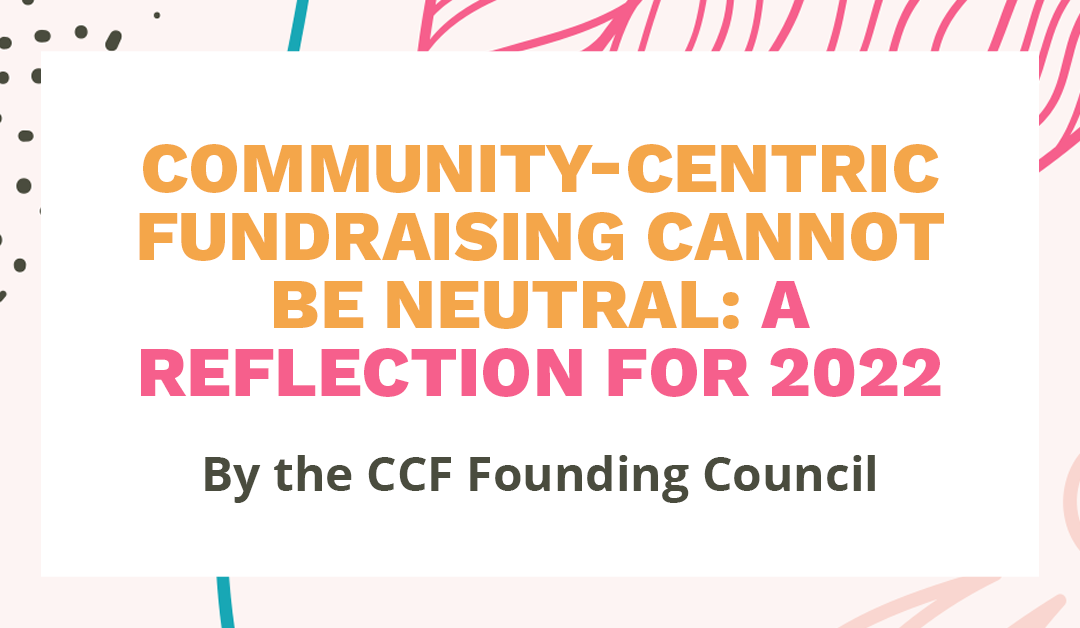“If we want a beloved community, we must stand for justice.”
— bell hooks
A question that often comes up in our in our sector is: “Should fundraising be ‘neutral?’” Meaning, should fundraising and fundraisers stay out of political discourse? Should we avoid contentious causes and stances? Should we simply raise money and let other leaders in the sector deal with the challenging and polarizing conversations?
After all, the way in which the nonprofit sector has been built legally prohibits most organizations from directly or indirectly participating in political campaigns for candidates. And many foundations actively discourage political involvement, lobbying, and advocacy.
But this in no way means that our work and our movements must remain neutral. Everything we do and every choice we make is political.
Community-Centric Fundraising (CCF) as a movement, even one that is driven by people of color, is not monolithic — so, on some level, we may all have different opinions. This is healthy and will shape the movement and evolution of fundraising in exciting ways.
However, at the same time, CCF was created with a specific goal in mind. Our first, and arguably most important, principle is that “Fundraising must be grounded in race, equity, and social justice.” We believe all fundraisers are agents of justice and that the act of raising money and other resources is a tool that we can use to create a better, more equitable world — to achieve liberation.
As such, CCF, as a movement and as an evolving set of practices, cannot be neutral. In the words of Desmond Tutu, “If you are neutral in situations of injustice, you have chosen the side of the oppressor.” Any movement striving to be grounded in race, equity, and social justice must take bold and courageous stances and actions. As a result, we believe CCF must support:
- reparation for the enslavement of and other injustices perpetrated on Black people
- truth and reconciliation and the return of stolen Indigenous land and other actions to address the violence inflicted on Native communities
- the right to abortions
- marriage equality and other rights for LGBTQIA+ people
- the rights of trans and gender non-conforming folks to determine their gender identities
- immigrants and refugees and open borders
- religious freedom and the fight against anti-semitism and Islamophobia
- Palestine’s freedom from violence and oppression by the Israeli state, with the understanding that zionism and Judaism are separate
- accessibility and the rights of disabled people
- vaccine mandates and other measures determined to curb COVID-19 and other public health issues
- voting rights
- the election of more women of color and other leaders from marginalized communities into political office
- taxes in general, raising taxes on wealthy people and corporations in particular, with the understanding that so much injustice is caused by Capitalism
- taking actions to address climate change
- defunding and abolishing the police
- gun control
- taking stances against white supremacy and white nationalism
These are the beliefs of the members of the CCF Founding Council. The CCF Founding Council, like the movement, is also polylithic — so we acknowledge there are plenty of areas where we do not have the knowledge and lived experience. Through redistributing power to those who do, we will refine and evolve our views.
We urge the movement to grapple with these over the next year to define and/or refine this set of principles to guide the founding of the CCF Global Council (more info to come soon on this) and how the movement will apply and adhere to these principles. It is our hope that we can create a culture of deep and honest conversations to arrive at a set of bold but universally-held beliefs that we all can share.
CCF was founded in response to the fact that traditional fundraising has been neutral, that its neutrality has in many ways helped to perpetuate the very injustices we fundraisers and our organizations have been raising money to fight. In the words of bell hooks, “If we want a beloved community, we must stand for justice.”
It is time for us to evolve fundraising beyond a neutral set of practices, into a powerful force that intentionally centers and lifts up the people and communities that are most affected by systemic injustice.
Discover more from CCF
Subscribe to get the latest posts sent to your email.


I don’t understand the decision to focus on injustice in Palestine. If you start looking at injustices around the world, you should have a much larger list. What about Myanmar, where a female Nobel Peace Prize winner, elected president, is now sitting in jail? Look at what is happening in Syria. That is a tragedy. I could go on with many more examples.